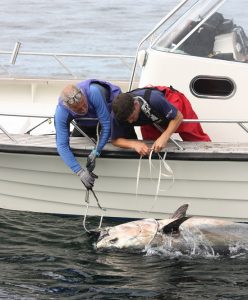The Angling Trust is supporting a two-year scientific study to confirm the return of Atlantic bluefin tuna in British waters and investigate their movements.
 The Thunnus UK Project is being carried out by the University of Exeter and the Centre for Environment, Fisheries and Aquaculture Science (Cefas) and will use state-of-the-art tracking devices to improve knowledge of the species and help secure its future around the UK.
The Thunnus UK Project is being carried out by the University of Exeter and the Centre for Environment, Fisheries and Aquaculture Science (Cefas) and will use state-of-the-art tracking devices to improve knowledge of the species and help secure its future around the UK.
Atlantic bluefin tuna are amongst the biggest, fastest and most valuable fish in the sea and were once a common sight in UK waters, ranging throughout the Celtic and North Sea. However, they largely disappeared from British waters in the 1990s, possibly due to overfishing, and are now recognised as an endangered species.
In recent years they have been observed more frequently in UK coastal waters, particularly during the late summer, autumn and winter as they move into coastal areas to feed on energy rich fish such as sprats and herring.
The research team will be supported by the Department for Environment, Food and Rural Affairs (Defra) and the European Maritime and Fisheries Fund, and scientists will work with stakeholders including commercial fishers, recreational anglers, wildlife watchers and NGOs to share knowledge and to deploy around 40 satellite tracking devices.
The Angling Trust has been pushing the government to begin a tagging project since bluefin tuna started appearing in inshore UK waters three or four year ago when anglers fishing for sharks began to see them and catch them accidentally.
Vast numbers of tuna up to 400kg have been returning to the Baltic Sea where the Angling Trust’s sister organisations in Denmark and Sweden have already completed a successful tagging project in 2017. Anglers have also been tagging tuna successfully with scientists off the west coast of Ireland for a number of years and Norway looks set to begin a tagging project in the near future.
Atlantic bluefin tuna can migrate over huge distances, moving over the entire Atlantic Ocean to North America and back again in a single year, crossing both coastal waters and the deep offshore. However, despite historic evidence, little is known about their movements, how long they stay in British waters and where they go once they leave.
The work will help scientists to understand:
- Where and when Atlantic bluefin tuna are found in British waters;
- Long-distance migrations and where Atlantic bluefin tuna go when they are not in UK coastal waters;
- Where Atlantic bluefin tuna found in UK waters go to breed; and
- Interactions between Atlantic bluefin tuna and both commercial and recreational fisheries.
The information will improve knowledge of the species, ultimately aiding in their future conservation.
Dr David Righton, lead scientist on the project for Cefas, said: “This exciting collaboration will enable us to gather and share knowledge of this incredible species, and uncover the role they play in UK waters. Cefas has a long history of investigating the behaviours and migrations of many species of fish, and we’re looking forward to using our expertise to address some of the fundamentally important questions that need answering about bluefin tuna.”
Dr Matthew Witt, lead scientist on the project for the University of Exeter, said: “This a ground-breaking project for the UK and another important step towards the use of evidence-based approaches for marine conservation.
“These are huge, exciting top predators, yet with an uncertain future. We are incredibly excited to be able to work on these fish, which I suspect to many conjure thoughts of tropical warm waters, yet they are here in our coastal sea.”
David Mitchell, Angling Trust’s Head of Marine, said: “The return of bluefin tuna to UK waters has generated huge excitement amongst UK sea anglers. Tunny, as they were known, were once a top target for anglers fishing in the South West and the North Sea before they disappeared. The Angling Trust is very excited about helping the sea angling community become involved in this research project.
“Looking into the future, the Angling Trust can see the potential opportunity for a legitimate recreational bluefin tuna fishery to work alongside further scientific research and conservation. As well as helping to advance science, this would bring huge economic and employment benefits to many coastal communities.
“We would like to remind anglers that bluefin tuna are currently protected and should not be targeted. Any caught accidentally should be released unharmed as soon as possible and not brought onboard the boat.”
Photos by Markus Lundgren




















